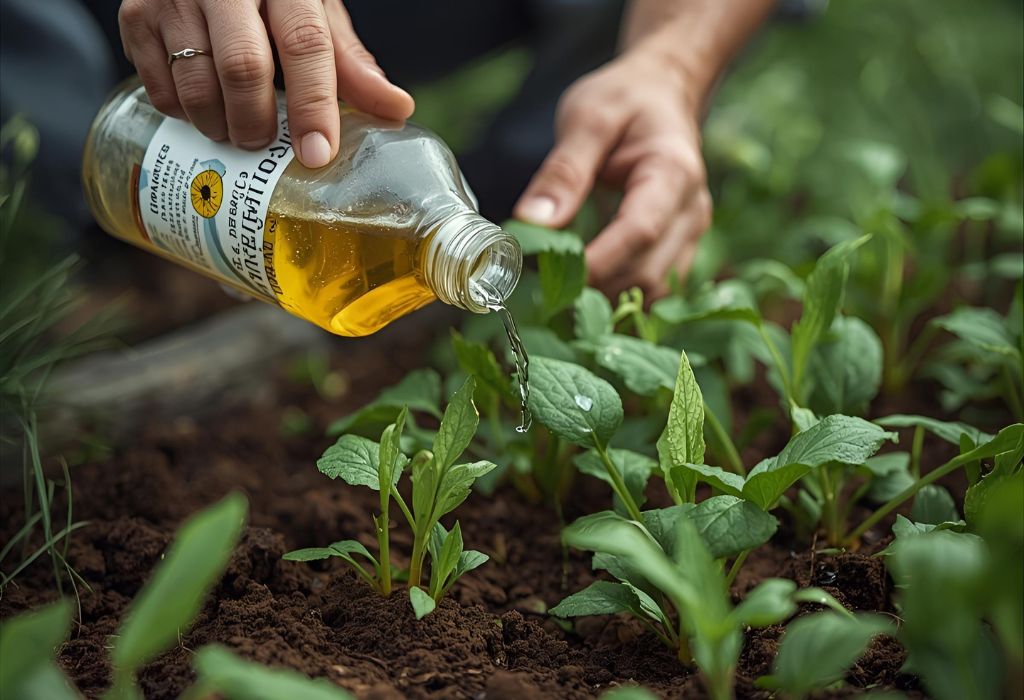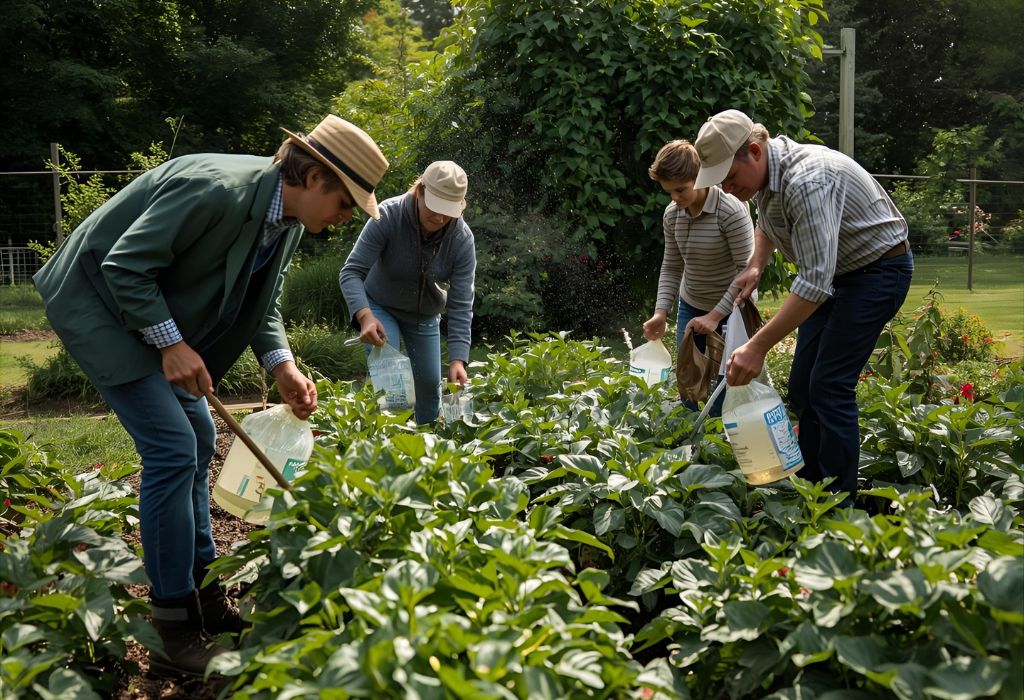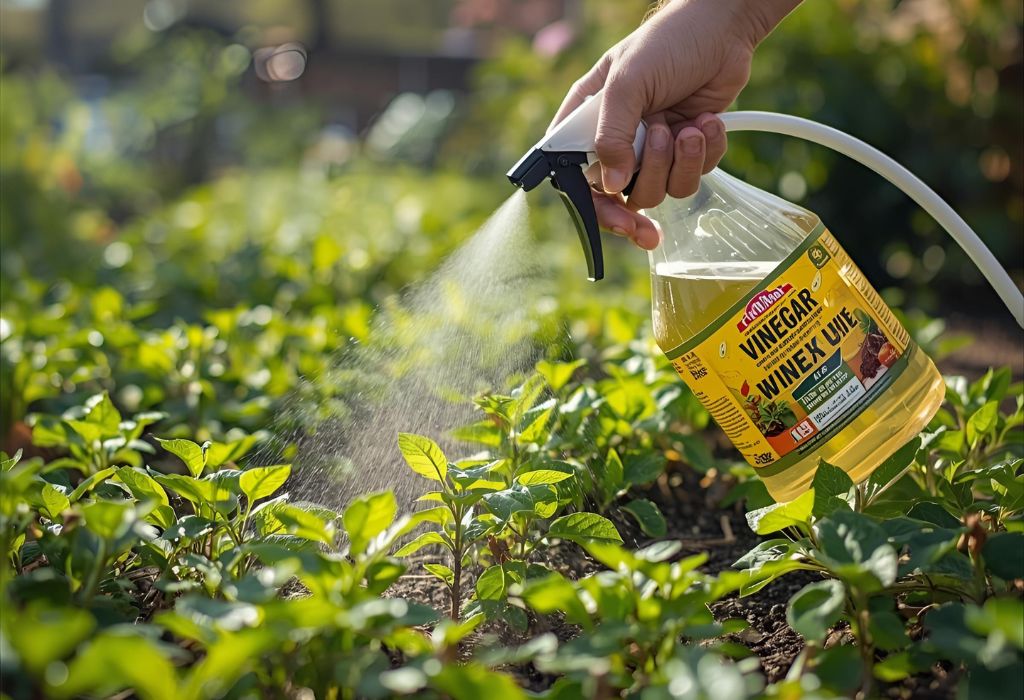Picture stepping into your garden on a sunny morning, only to find weeds pushing through the soil and competing with your plants.
They grow fast, spread quickly, and seem to return no matter how often they are pulled out.
Many gardeners turn to chemical herbicides, but these can damage soil health, harm beneficial insects, and even pose risks to pets.
The search for a safe, affordable, and eco-friendly alternative has led many to ask a simple question: can vinegar kill weeds in the garden?
At first, vinegar may sound too ordinary to work as a weed killer. After all, it is a common household product more often used in kitchens than in flower beds
. Yet its acetic acid content has the power to dry out plant leaves, making it surprisingly effective against many types of weeds.
Vinegar is particularly popular among gardeners who want a natural weed control method. It is inexpensive, easy to find, and does not require complex mixing or storage.
For young weeds with shallow roots, vinegar can work within hours, turning fresh green leaves brown and brittle.
The effectiveness of vinegar, however, depends on several factors such as strength, application method, and weed type.
Household vinegar may not kill deep-rooted perennials, while stronger horticultural vinegar can burn both weeds and nearby plants if not applied carefully.
With the global organic gardening market growing rapidly, natural solutions like vinegar are gaining attention 【source: https://www.alliedmarketresearch.com/hot-melt-adhesives-market】. For many, it offers a balance between effectiveness and safety, but it also comes with limitations every gardener should know.
This guide explores how vinegar works on weeds, the best ways to apply it, and whether it can be a long-term solution for garden weed control.
How Vinegar Works on Weeds

Vinegar contains acetic acid, which damages plant cell walls and dehydrates leaves. This process causes the weed to dry out and collapse.
Household vinegar typically contains 5% acetic acid, which works well on small, shallow-rooted weeds. Horticultural vinegar may contain 20–30% acetic acid, offering stronger results but requiring caution.
Young weeds are most vulnerable to vinegar applications. Perennials with deep roots often survive because vinegar rarely penetrates the root system.
Effectiveness improves when vinegar is applied on hot, sunny days. The heat speeds up dehydration and makes results more noticeable.
Can vinegar kill weeds in the garden?
Yes, vinegar can kill many weeds, especially young or shallow-rooted ones.
Does vinegar kill the roots?
No, most vinegar types only burn top growth.
Is horticultural vinegar stronger?
Yes, it contains 20–30% acetic acid and works faster.
Will vinegar harm soil microbes?
Small amounts have little effect, but heavy use may reduce microbial activity.
Types of Vinegar for Weed Control

White distilled vinegar is the most common type used in gardens. It contains about 5% acetic acid and is inexpensive and widely available.
Apple cider vinegar has similar strength but is less practical due to higher cost. It can be used but offers no additional benefits over white vinegar.
Horticultural vinegar contains 20–30% acetic acid. It is much stronger and can quickly burn weeds, but it must be handled carefully.
When comparing costs, household vinegar is the cheapest option for casual use. Horticultural vinegar is more expensive but provides faster, stronger results.
Can I use kitchen vinegar?
Yes, but it is most effective on small, young weeds.
Is horticultural vinegar safe?
It is effective but can irritate skin and eyes.
Does apple cider vinegar work?
Yes, but it is not cost-effective.
Which type is most effective?
Horticultural vinegar delivers the strongest results.
How to Apply Vinegar to Kill Weeds

The best way to apply vinegar is with a spray bottle or garden sprayer. Aim directly at the weed leaves without touching surrounding plants.
Application should be done on a hot, sunny day. Sunlight enhances the dehydrating effect of acetic acid.
Do not dilute vinegar if you want maximum strength. Household vinegar should be applied full strength for the best outcome.
For stubborn or perennial weeds, multiple applications may be necessary. Reapply every week until results are visible.
Do I need to dilute vinegar?
No, use it full strength for best results.
When should I spray vinegar?
During dry, sunny days for maximum effectiveness.
How long does it take to work?
Leaves start wilting within hours.
Do I need to reapply?
Yes, especially for tougher perennial weeds.
Can Vinegar Kill Weeds Permanently?
Household vinegar rarely kills weeds permanently. It burns the visible leaves, but roots often survive and regrow.
Horticultural vinegar is more powerful and may provide longer-lasting results. However, even it struggles against deep-rooted perennials.
For weeds like dandelions, bindweed, or thistles, vinegar alone is usually not enough. These weeds need repeated applications or combined control methods.
Vinegar works best as part of an integrated weed management strategy. Combining it with mulching or manual removal improves results.
Does vinegar kill weeds permanently?
No, regrowth is common with perennial weeds.
Will vinegar stop seed germination?
It may prevent surface seeds from sprouting temporarily.
How often should I reapply?
Every 1–2 weeks until weeds die back.
What weeds are hardest to kill?
Deep-rooted weeds like dandelions and thistles.
Vinegar vs. Chemical Herbicides
Chemical herbicides are systemic, meaning they travel through the plant to kill roots. Vinegar acts as a contact herbicide, burning only the exposed leaves.
The advantage of vinegar is safety. It does not leave harmful residues and is considered safer for pets and the environment.
The disadvantage is limited effectiveness. Chemical herbicides usually require one application, while vinegar often needs several.
Gardeners who prefer eco-friendly gardening often choose vinegar despite its limitations. It provides a natural option without harsh chemicals.
Is vinegar safer than chemicals?
Yes, it is safer when applied responsibly.
Is vinegar cheaper?
Yes, household vinegar is very affordable.
Which works faster?
Vinegar shows results in hours, while chemicals take days.
Which lasts longer?
Chemical herbicides provide longer-lasting control.
Homemade Vinegar Weed Killer Recipes
The simplest recipe is plain white vinegar applied directly. It works best on young weeds in sunny conditions.
A popular mixture is vinegar, salt, and dish soap. Salt helps dry the weeds, while soap makes vinegar stick better.
This mixture can be powerful but should be used carefully. Salt can damage soil fertility and prevent future plant growth.
Homemade recipes are affordable and easy to make. However, they should be applied carefully to avoid harming desirable plants.
Does salt improve vinegar weed killer?
Yes, but it can harm soil health long term.
What does dish soap do?
It helps vinegar stick to leaves.
Is homemade weed killer safe?
Yes, if applied only to weeds.
Can I use this in vegetable gardens?
Yes, but carefully spot-spray weeds only.
Risks of Using Vinegar in the Garden
Vinegar is non-selective, meaning it kills any plant it touches. This makes it risky near flowers, vegetables, or lawns.
It can harm delicate garden plants if the spray drifts in the wind. Always shield desired plants when spraying.
Overuse may slightly lower soil pH, though this effect is usually temporary. Strong horticultural vinegar is more likely to cause issues.
Direct contact with skin or eyes can cause irritation or burns. Protective gear is recommended when using high-strength vinegar.
Will vinegar kill grass too?
Yes, it burns grass blades on contact.
Can it harm garden plants?
Yes, if accidentally sprayed on them.
Does it change soil permanently?
No, effects are temporary with normal use.
Is horticultural vinegar dangerous?
Yes, it requires gloves and eye protection.
Alternatives to Vinegar for Natural Weed Control

Mulching is one of the best alternatives. It smothers weeds and prevents seed germination.
Boiling water can also kill weeds by scalding the leaves and stems. It works best on small patches or cracks in pavement.
Manual weeding remains effective, especially for deep-rooted perennials. Using hand tools ensures complete removal of roots.
Corn gluten meal works as a natural pre-emergent, preventing new weeds from sprouting. It is safe for lawns and gardens when applied properly.
Is boiling water effective?
Yes, but only for small areas.
Does mulching stop weeds?
Yes, it blocks light and prevents growth.
What is corn gluten meal?
A natural product that prevents weed seeds from germinating.
Is hand weeding still best?
Yes, for stubborn weeds with deep roots.
Best Practices for Using Vinegar Safely
Apply vinegar on sunny, wind-free days to reduce drift. This ensures weeds are targeted without harming nearby plants.
Use cardboard or plastic shields to protect vegetables and flowers. This helps isolate weeds during spraying.
Always wear gloves and eye protection when handling strong vinegar. Horticultural vinegar can cause burns if misused.
Store vinegar solutions out of reach of children and pets. Safety is essential in both the garden and the home.
Should I wear gloves?
Yes, especially with strong vinegar.
Can wind spread the spray?
Yes, so only spray on calm days.
Should I spray soil?
No, only spray weed leaves.
Can pets enter the area after spraying?
Yes, once the vinegar has dried.
Future of Natural Weed Control

Eco-friendly gardening continues to grow in popularity worldwide. Consumers want safer alternatives to chemical herbicides.
New organic acids are being tested for more effective weed control. These may provide deeper penetration and longer-lasting results.
Researchers are also combining vinegar with biological controls. These methods aim to create natural herbicides that target roots as well as leaves.
With organic gardening expanding, vinegar and other natural solutions will remain important. Future products may improve both safety and effectiveness.
Will vinegar always be popular?
Yes, because it is safe and affordable.
Are new natural herbicides coming?
Yes, with stronger and longer-lasting effects.
Can vinegar be commercialized?
It already is sold as horticultural vinegar.
Is organic gardening growing?
Yes, it is rapidly expanding worldwide.
Conclusion
Vinegar can kill weeds in the garden by dehydrating their leaves. It is effective, affordable, and eco-friendly, but it is not always permanent.
Household vinegar works best on young weeds, while horticultural vinegar provides stronger results. Neither option reliably kills deep-rooted perennials.
Despite its limitations, vinegar remains a valuable tool in natural weed control. It offers gardeners a safe alternative to harsh chemicals.
For anyone asking “can vinegar kill weeds in the garden,” the answer is yes, but with proper use and realistic expectations. Combined with other methods, vinegar helps keep gardens healthy and weed-free naturally.
I’m Maya L. Greenwood, a lifelong plant lover who believes anyone can grow something beautiful with the right guidance. After years of testing soil mixes, pruning methods, irrigation tricks, and pest-safe solutions, I started EasyGardenTips.com to turn hard-won lessons into step-by-step advice. From seed starting and container gardens to composting and seasonal checklists, my goal is to make gardening simple, sustainable, and fun.
